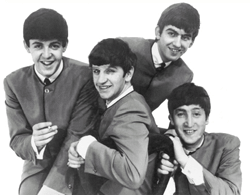 |
 |
Levels of language & pop group names
Analysis of the popgroup name, The Beatles
 This
is arguably the name of the most famous pop group ever. This
is arguably the name of the most famous pop group ever.
The grammatical construction of the name is pretty ordinary, a noun
phrase consisting of the definite article modifying a single head noun
. The prototypical pop group name consists of a noun phrase beginning
with 'the' (e.g. 'The Four Tops', 'The Shadows'). The first pop group
names often had the name of the lead singer first, with the group name
co-ordinated to it (e.g. 'Bill Haley and the Comets', 'Buddy Holly and
the Crickets', 'Gerry and the Pacemakers', 'Diana Ross and the Supremes').
'The Beatles' is more interesting lexically, as it is an invented word
which did not exist in the language prior to the group. It thus arrested
the attention when it was first used. The head noun is homophonous (has
the same phonemes, or distinctive sounds) with the word 'beetles' but
it is interesting that these days few of us make the association between
the words. This is probably because most people think favourably of the
Beatles and so blot out the possible negative associations.
It is the graphology which leads to the lexical invention. The head
noun consists of the morpheme 'beat' (a noun derived from a verb indicating
strong physical action which is semantically appropriate because in their
early days at least the Beatles were a beat group), with a plural '-le'
ending. The ending does not quite have morphemic status (that is, it is
not a fully meaningful sub-part of a word), but verbs ending in '-le'
are often associated with iterative (repeated) movement (cf. 'mumble,
grumble, trickle, rattle), and again that is appropriate for a group who
played and sang songs with a heavy rhythmic beat. The head noun of the
noun phrase is capitalised, which will remind readers of proper names
and the titles of books etc.
Overall, then, 'The Beatles' is an inventive name, designed to catch
the attention and also be structurally appropriate to the kind of music
the group played.
|

